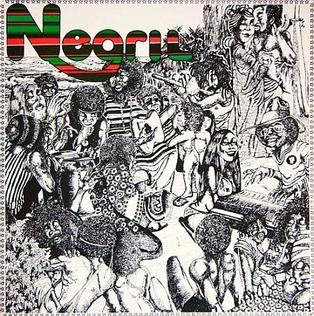
Ska is a music genre that originated in Jamaica in the late 1950s and was the precursor to rocksteady and reggae. It combined elements of Caribbean mento and calypso with American jazz and rhythm and blues. Ska is characterized by a walking bass line accented with rhythms on the off beat. It was developed in Jamaica in the 1960s when Stranger Cole, Prince Buster, Clement "Coxsone" Dodd, and Duke Reid formed sound systems to play American rhythm and blues and then began recording their own songs. In the early 1960s, ska was the dominant music genre of Jamaica and was popular with British mods and with many skinheads.

Ernest Ranglin is a Jamaican guitarist and composer who established his career while working as a session guitarist and music director for various Jamaican record labels including Studio One and Island Records. Ranglin played guitar on many early ska recordings and helped create the rhythmic guitar style that defined the form. Ranglin has worked with Theophilus Beckford, Jimmy Cliff, Monty Alexander, Prince Buster, the Skatalites, Bob Marley and the Eric Deans Orchestra. He is noted for a chordal and rhythmic approach that blends jazz, mento and reggae with percussive guitar solos incorporating rhythm 'n' blues and jazz inflections.

Bob Marley and the Wailers were a Jamaican ska, rocksteady and reggae band. The founding members, in 1963, were Bob Marley, Peter Tosh, and Bunny Wailer.

Christopher Percy Gordon Blackwell OJ is a Jamaican-British former record producer and the founder of Island Records, which has been called "one of Britain's great independent labels." According to the Rock and Roll Hall of Fame, to which Blackwell was inducted in 2001, he is "the single person most responsible for turning the world on to reggae music." Variety describes him as "indisputably one of the greatest record executives in history," while Barron's has described him as "a contender for most interesting man in the world."

Montgomery Bernard "Monty" Alexander OJ CD is a Jamaican American jazz pianist. His playing has a Caribbean influence and bright swinging feeling, with a strong vocabulary of bebop jazz and blues rooted melodies. He was influenced by Louis Armstrong, Duke Ellington, Erroll Garner, Nat King Cole, Oscar Peterson, Ahmad Jamal, Les McCann, and Frank Sinatra. Alexander also sings and plays the melodica. He is known for his surprising musical twists, bright rhythmic sense, and intense dramatic musical climaxes. His recording career has covered many of the well-known American songbook standards, jazz standards, pop hits, and Jamaican songs from his original homeland. Alexander has resided in New York City for many years and performs frequently throughout the world at jazz festivals and clubs.
Oku Nagba Ozala Onuora, known as the "father of Jamaican dub poetry" is a Jamaican dub poet and performer.

Millicent Dolly May Small CD was a Jamaican singer who is best known for her international hit "My Boy Lollipop" (1964). The song reached number two in both the UK and US charts and sold over seven million copies worldwide. It was also the first major hit for Island Records and helped to achieve the label its mainstream success. She was the Caribbean's first international recording star and its most successful female performer.
Byron Lee and the Dragonaires are a Jamaican ska, calypso and soca band. The band played a crucial pioneering role in bringing Caribbean music to the world. Byron Lee died on 4 November 2008, after suffering from cancer for a sustained period.

Junior Murvin was a Jamaican reggae musician. He is best known for the single "Police and Thieves", produced by Lee "Scratch" Perry in 1976.
Kentrick Patrick OD, known professionally as Lord Creator, was a Trinidadian calypso, R&B, ska, and rocksteady musician and singer. Alongside Cuban-born Roland Alphonso, Barbadian Jackie Opel and fellow Trinidadians Lynn Taitt and Lord Brynner, Lord Creator was an important and positive "outside" influence during the early development of the Jamaican music scene.
Lancelot Henry Stuart Hayward was a jazz pianist who was born in Bermuda, where he lived until he settled in New York City at the age of 50. Blind since infancy, he received formal training in classical piano and was a self-taught jazz musician, eventually becoming one of Bermuda's best-known jazz artists. He was often the accompanist of choice for Carmen McRae, Marvin Gaye and others when they performed on the island.
The Skatalites are a ska band from Jamaica. They played initially between 1963 and 1965, and recorded many of their best known songs in the period, including "Guns of Navarone." They also played on records by Prince Buster and backed many other Jamaican artists who recorded during that period, including Bob Marley & The Wailers, on their first single "Simmer Down." They reformed in 1983 and have played together ever since.

Dr. No is the film score for the 1962 film of the same name composed by Monty Norman.
The history of the Jews in Jamaica predominantly dates back to migrants from Spain and Portugal. Starting in 1509, many Jews began fleeing from Spain because of the persecution of the Holy Inquisition. When the English captured Jamaica from Spain in 1655, the Jews who were living as conversos began to practice Judaism openly. By 1611, the Island of Jamaica had reached an estimated population of 1,500 people. An estimated 75 of those people were described as "foreigners," which may have included some Portuguese Jews. Many Jamaican Jews were involved in the Atlantic slave trade, both owning and trading in enslaved Black people.
Jerome "Jah Jerry" Haynes OD was a Jamaican guitarist and former member of The Skatalites.

Negril is an album released in 1975 from a session produced, arranged, and almost entirely composed by guitarist Eric Gale. It includes some of Jamaica's best-known musicians of the time. The album expresses Gale's fondness for the beach and natural beauty of the Jamaican seaside village Negril, which became a popular destination for tourists.
Clue J & His Blues Blasters were a Jamaican band of the late 1950s and early 1960s led by Cluett Johnson, who were one of the first bands to play ska. Several of the band's members went on to join The Skatalites.

Jaime Hinckson is a Jamaican American jazz pianist and composer who produces reggae, hip hop, and R&B music. Hinckson's unique improvisational style draws from traditions of jazz along with his strong Caribbean heritage. His musical influences include Erroll Garner, Monty Alexander, and his childhood jazz piano instructor Leslie Butler (musician).

In Search of the Lost Riddim is an album by the Jamaican musician Ernest Ranglin, released in 1998. It was among the first releases from Chris Blackwell's Palm Pictures label; Blackwell's Island Records had signed Ranglin in the 1950s. The album title refers to Ranglin's decades-long absence from making music in Africa. Ranglin supported the album by playing North American shows with Baaba Maal. The album was a success on the Specialist albums chart in the United Kingdom.

Lance Hayward at the Half Moon Hotel, Volume 2 is a 1960 studio album by Bermudian jazz pianist Lance Hayward. It is the follow-up to his 1959 debut Lance Hayward at the Half Moon Hotel and is the second-ever album released on Chris Blackwell's Island Records. Whereas the first album had called the pianist "Lance Haywood" incorrectly, on this album he is identified properly.












